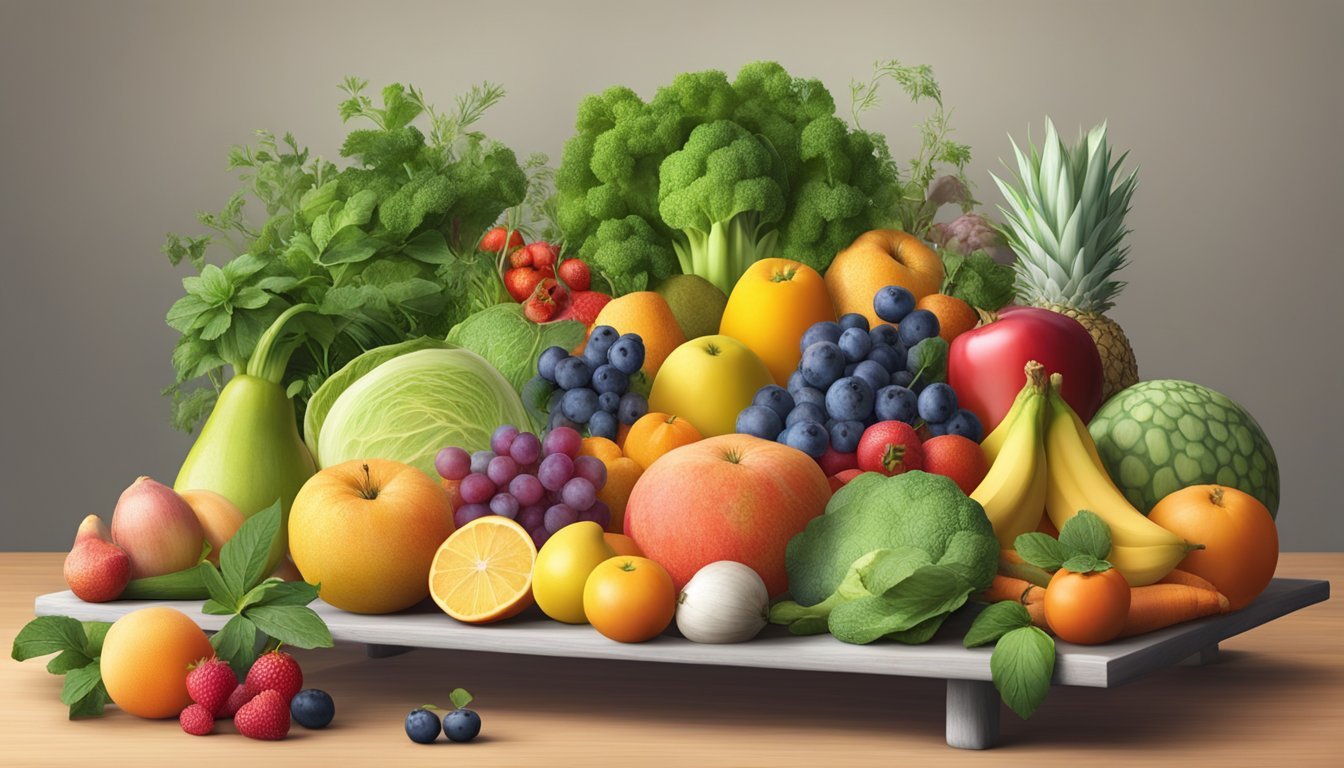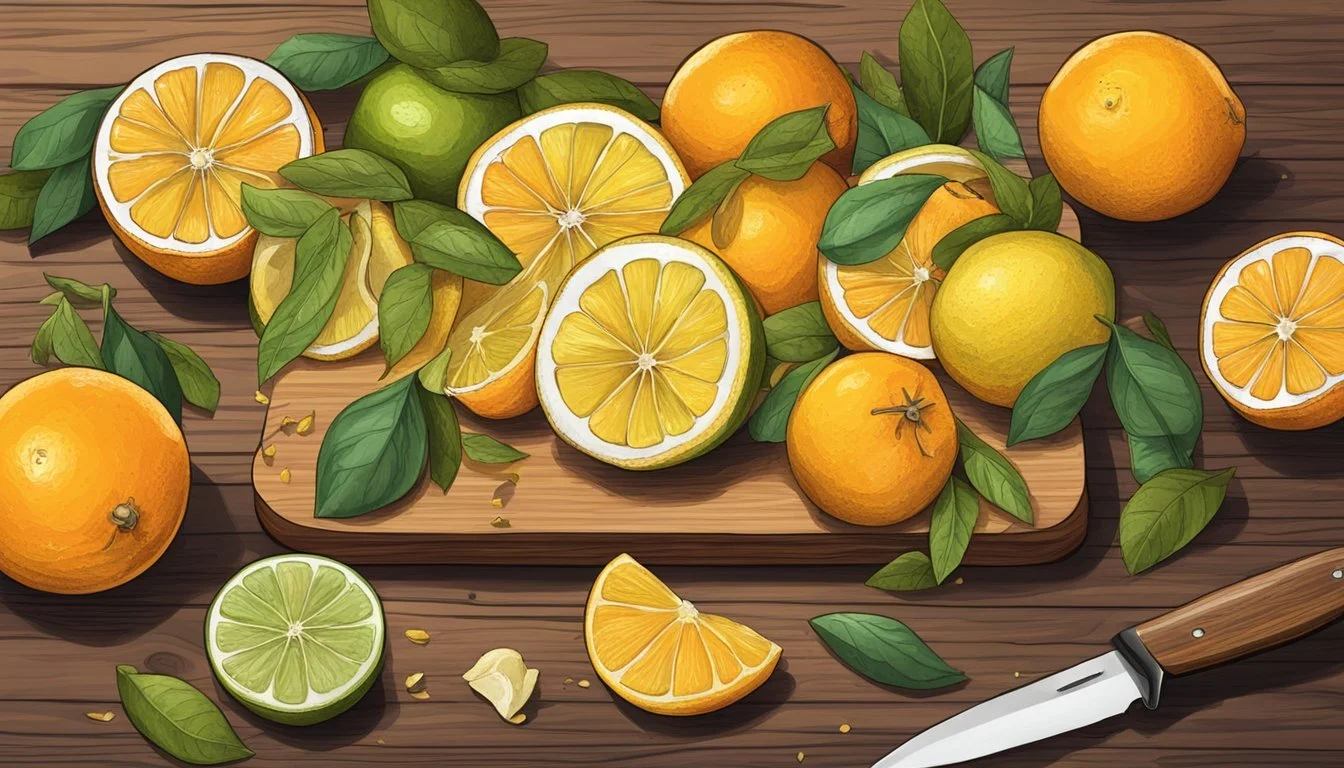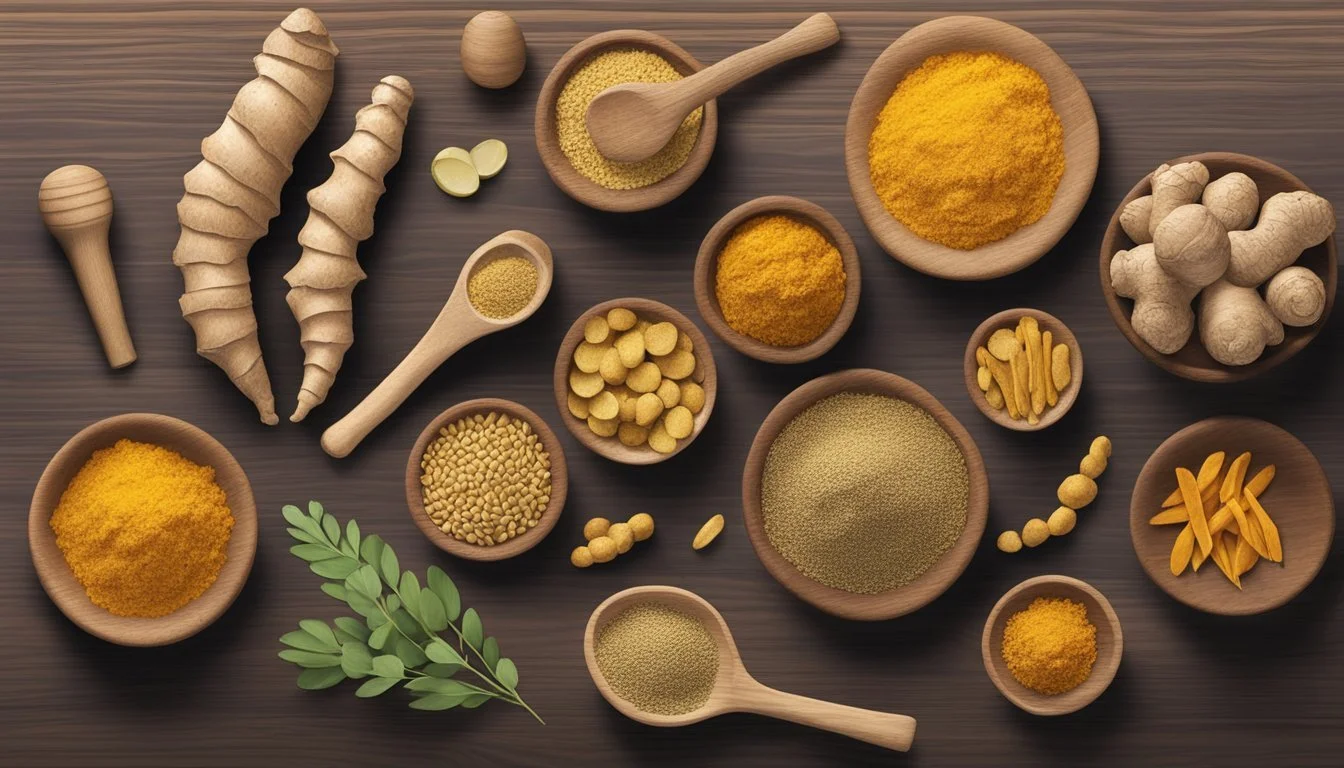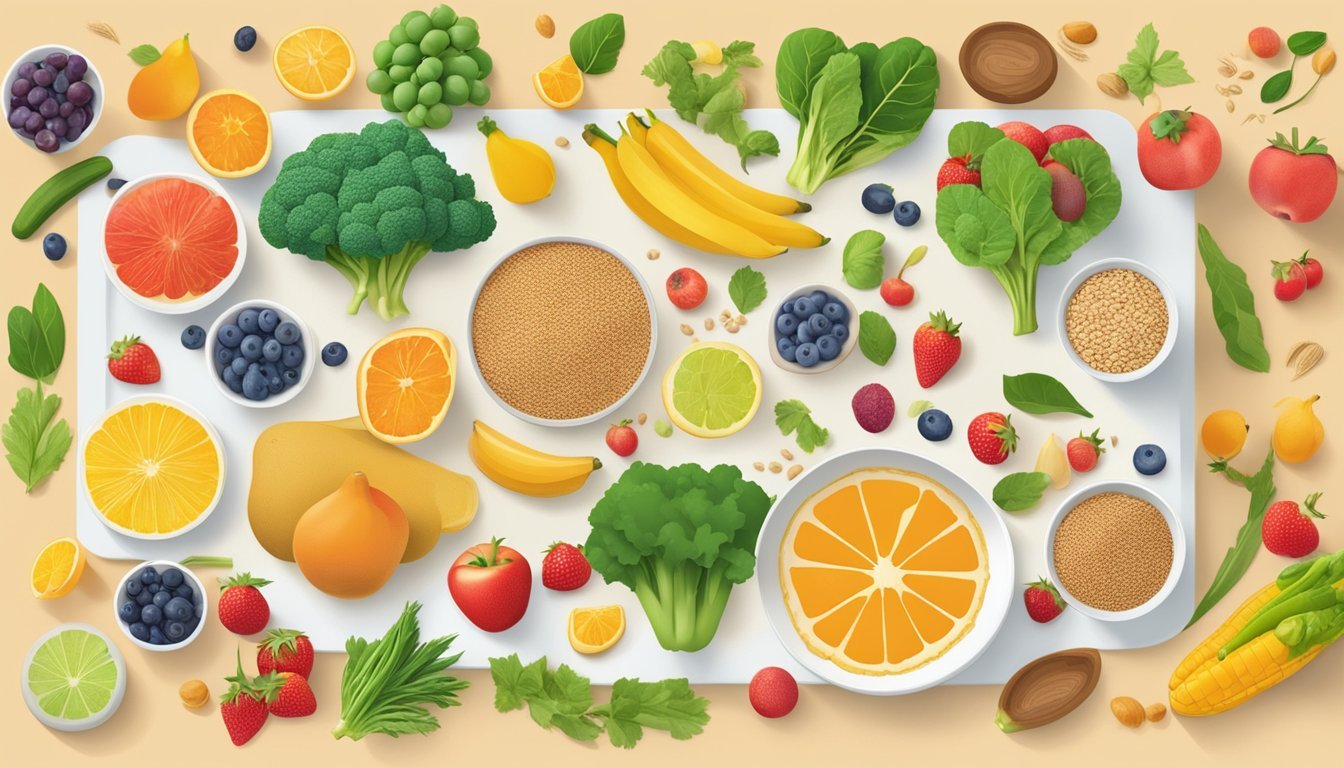Nourishing Your Qi: Essential Foods to Relieve Stagnation and Boost Energy Flow
Qi stagnation, a term rooted in traditional Chinese medicine, refers to the blockage or improper flow of the body's vital energy. This imbalance can manifest through various symptoms such as stress, irritability, and physical discomfort. Addressing qi stagnation often incorporates physical activities, acupuncture, and dietary changes.
Foods play a crucial role in alleviating qi stagnation, offering a natural and accessible means to restore balance. Certain dietary choices can promote smoother energy flow and enhance one's overall well-being. By understanding and incorporating these foods, individuals can support their body’s inherent healing processes effectively.
1) Ginger Tea
Ginger tea is known for its potential to support the flow of Liver Qi. It contains compounds that may help soothe the digestive system and reduce internal stress. This calming effect can be beneficial for alleviating symptoms of Qi stagnation.
To prepare ginger tea, slice fresh ginger root and add it to boiling water. Let it steep for about 10 minutes before removing the ginger slices. The resulting tea has a spicy, warming flavor that can be enjoyed hot or cold.
Drinking ginger tea regularly may help improve circulation. Its warming properties can also assist in dispelling cold, which is believed to contribute to Qi stagnation. Enjoying a cup of ginger tea in the morning can be an excellent way to start the day.
Ginger tea can be combined with other ingredients for enhanced benefits. Adding a slice of lemon or a teaspoon of honey can provide additional soothing and digestive properties. This makes the tea both flavorful and beneficial for overall health.
2) Dang Gui (Chinese Angelica Root)
Dang Gui, also known as Chinese Angelica Root, is a staple in Traditional Chinese Medicine (TCM). It belongs to the category of tonic herbs used primarily to address Blood Deficiency.
This herb is known for its unique bitter-sweet flavor and warm or neutral nature.
One of the key benefits of Dang Gui is its ability to tonify the blood. This means it helps to nourish and invigorate the blood, making it beneficial for conditions where blood flow and vitality are compromised.
It is especially effective for individuals experiencing fatigue or weakness due to blood deficiency.
Dang Gui is often used in combination with other herbs to enhance its effectiveness. For example, a combination of Dang Gui and Huang Qi (Astragalus Root) is commonly used to both tonify the blood and replenish Qi.
This makes it an excellent choice for alleviating lethargy.
The root can be used in various forms. The whole root, known as Quan Dang Gui, or specific parts like Dang Gui Tou (the head) and Dang Gui Shen (the body) each have different properties.
The head has a stronger tonifying action, while the body is better at nourishing blood.
Preparation methods can also influence its effects. For instance, dry frying Dang Gui increases its warmth, which can help tonify blood without causing digestive issues like loose stools or diarrhea.
In summary, Dang Gui is a versatile and powerful herb, widely used in TCM for its blood-nourishing and Qi-replenishing properties.
3) Citrus Peel (Chen Pi)
Citrus peel, known as Chen Pi in Traditional Chinese Medicine (TCM), is derived from the dried peel of mature tangerines. It is valued for its ability to regulate Qi, which is essential for alleviating Qi stagnation.
Chen Pi is categorized among herbs that regulate Qi. Its properties include being pungent, bitter, and warm. These attributes make it effective in promoting the flow of Qi in the body’s organs and meridians, particularly the Stomach, Liver, and Spleen.
The drying and warming properties of Chen Pi help clear dampness and reduce phlegm, which can contribute to Qi stagnation. By facilitating the smooth movement of Qi, it aids in digestion and alleviates symptoms such as bloating, gas, and discomfort.
Incorporating Chen Pi into the diet can be done through various means. It can be added to soups, broths, or teas. Combining it with other ingredients that support Qi flow can enhance its effectiveness.
Chen Pi’s ability to harmonize the Liver, Spleen, and Stomach makes it a versatile addition to dietary practices aiming to resolve Qi stagnation. Its moderate, warm energy provides a balanced approach to regulating the body's internal functions.
4) Turmeric
Turmeric, a bright yellow spice commonly used in Asian cuisine, is known for its active compound, curcumin. Curcumin has anti-inflammatory and antioxidant properties which can help in managing liver Qi stagnation.
Including turmeric in the diet can promote better digestion and blood circulation. These benefits support the liver's function and help in the smooth flow of Qi.
Turmeric can be added to various dishes like curries, soups, and teas. It's also available in supplement form for those who prefer a more concentrated dose.
For maximum benefits, it is often combined with black pepper, which enhances curcumin absorption in the body. This combination makes the therapeutic effects of turmeric more potent.
Regular consumption of turmeric, in moderation, as part of a balanced diet can aid in relieving symptoms associated with Qi stagnation in the liver.
5) Licorice Root
Licorice root is widely recognized in traditional Chinese medicine for its various health benefits. It can effectively support the flow of Qi by soothing and harmonizing the body.
Adding licorice root to one's diet helps to alleviate liver Qi stagnation. Its sweet flavor aids in soothing Qi, making it particularly beneficial.
This root is often used in teas and herbal formulas. It pairs well with other herbs that promote liver health, enhancing their effectiveness.
Incorporating licorice root into daily routines can promote a balanced flow of energy. It is a versatile herb that can be easily added to teas or consumed in supplement form.
Too much licorice root may have adverse effects. It is important to use it in moderation and consult with a healthcare provider before starting any new herbal regimen.
6) Goji Berries
Goji berries, also known as Wolfberry Fruit, have been a staple in Chinese medicine for over 2000 years. These small red berries are packed with vitamins A, C, and E, which help support the immune system and protect against oxidative stress.
In Chinese dietary therapy, goji berries are known for their ability to nourish the liver and kidneys. They help in promoting the flow of Qi, or life energy, within the body, making them an ideal choice for combating Qi stagnation.
Goji berries can be consumed in various ways. They are often steeped in hot water to make tea, eaten raw, or added to dishes such as soups and salads. Their sweet taste makes them versatile and easy to incorporate into different recipes.
Regular consumption of goji berries is believed to enhance vitality and energy levels. Their rich antioxidant content helps in reducing inflammation and supporting overall health, which can be beneficial in preventing Qi stagnation-related issues.
Many find that including goji berries in their diet helps improve digestion and boosts liver function. This can make them a valuable addition to any diet focused on promoting balanced Qi and well-being.
7) Hawthorn Berry
Hawthorn berry is widely regarded in traditional Chinese medicine for its potential benefits in addressing qi stagnation. These small, red berries have been used for centuries to promote cardiovascular health and improve blood circulation.
Rich in antioxidants, hawthorn berries help reduce inflammation which can contribute to stagnation. They are believed to support the functioning of the liver and spleen, vital organs in qi and blood movement.
Hawthorn berries can be consumed fresh, dried, or as an extract. They are often made into teas, tinctures, or included in herbal formulations. The berries' slightly tart taste is usually well-received and can be easily incorporated into various dishes.
Incorporating hawthorn berries into the diet may help to alleviate symptoms of qi stagnation such as bloating and discomfort. However, it is advisable to consult with a healthcare professional before adding new supplements or herbs to your regimen.
Regular consumption combined with other lifestyle changes like exercise and stress management can enhance the benefits of hawthorn berries in maintaining healthy qi flow.
8) Red Dates
Red dates, also known as jujubes, are highly regarded in traditional Chinese medicine for their health benefits.
These small, sweet fruits are believed to invigorate the spleen and stomach, enhancing the overall digestive process. They are also used to nourish the blood and calm the mind.
Rich in vitamins and minerals, red dates provide a natural boost to the immune system. Their high vitamin C content supports overall well-being and energy levels.
Red dates can be consumed in various forms, including dried, fresh, or made into teas and soups. They are often added to herbal decoctions to balance other ingredients.
Incorporating red dates into the diet is a simple and effective way to promote Qi movement and balance. Their pleasant taste makes them a versatile addition to both sweet and savory dishes.
9) Astragalus Root
Astragalus root, also known as Huáng Qí or Milk Vetch, is a popular herb in traditional Chinese medicine. This root is renowned for its ability to act as a Qi tonic, aiding in the optimal functioning of the body and naturally boosting energy, vitality, stamina, and strength.
Slices of dried astragalus root can be found at Chinese grocery stores and health food shops. It is typically simmered in soups or teas, providing a subtle, earthy flavor.
The potent compounds in astragalus root have been studied for their potential benefits, such as lowering blood sugar levels in individuals with type 2 diabetes. This makes it a valuable addition for those looking to manage their health naturally.
Incorporating astragalus root into the diet can be a holistic approach to improving Qi stagnation. It is considered one of the 50 fundamental herbs in Mongolian medicine and is frequently used in various culinary dishes and herbal preparations.
By integrating astragalus root into meals and beverages, individuals may experience an enhancement in their overall vitality and well-being. This ancient herb continues to be an essential component of traditional health practices.
10) Reishi Mushroom
Reishi mushrooms are known for their health benefits and are often used in traditional Chinese medicine. They help balance the body's Qi by acting as an immune modulator. This regulation aids in maintaining hormonal balance and homeostasis.
These mushrooms are beneficial for those experiencing stress, anxiety, or insomnia. Regular consumption may improve sleep quality, which is essential for restoring Qi.
Reishi mushrooms can also support mental health. By managing stress and promoting relaxation, they help in alleviating Qi stagnation caused by emotional distress.
Incorporating reishi mushrooms into one’s diet is simple. They can be consumed as supplements, teas, or added to soups and broths.
Understanding Qi Stagnation
Qi stagnation is a common concept in Traditional Chinese Medicine (TCM) and is vital for maintaining overall well-being. It often results from various lifestyle and emotional factors, impacting the body's energy flow.
What Is Qi?
Qi (pronounced "chee") is considered the vital life force that circulates through the body's meridians. This energy supports bodily functions and maintains balance. Proper Qi flow ensures the smooth operation of organs and physical systems, contributing to emotional and physical health.
When Qi runs smoothly, the body feels balanced and harmonized. Any disruption in this flow can lead to discomfort and health issues. Swelling, pain, digestive problems, and emotional disturbances are common symptoms of blocked or stagnant Qi.
Causes of Qi Stagnation
Several factors can lead to Qi stagnation. Stress is one of the primary culprits, often caused by daily pressures and emotional responses. Physical inactivity and a sedentary lifestyle also contribute significantly.
Dietary choices play a crucial role. Consuming excessive greasy or spicy foods, along with overeating, can disrupt the natural movement of Qi. Emotional states, such as anger, frustration, and depression, are known to block the flow of Qi, compounding the problem.
Environmental factors, including poor air quality and exposure to toxins, further hinder the smooth circulation of Qi. Understanding these causes is essential for addressing and preventing Qi stagnation effectively.
Dietary Principles for Promoting Qi Flow
Promoting Qi flow through diet involves balancing the body's energy forces and incorporating warming foods to stimulate the body's natural processes. This helps in relieving Qi stagnation and fostering overall health.
Balancing Yin and Yang
Balancing yin and yang is crucial for maintaining harmonious Qi flow in the body. Foods that help achieve this balance include green leafy vegetables, which provide vital nutrients without overburdening the system.
Yin foods such as cucumbers, melons, and dairy products offer cooling properties, beneficial for calming an overactive liver. On the other hand, yang foods like garlic, ginger, and onion are invigorating and help in warming the body and boosting Qi.
A balanced diet involves consuming a mix of both yin and yang foods. For instance, pairing garlic with spinach or adding a bit of ginger to cucumber salads can help maintain this equilibrium. Such combinations ensure that neither energy force dominates the body, promoting smooth Qi flow and preventing stagnation.
Incorporating Warm Foods
Incorporating warm foods is essential for stimulating Qi flow and alleviating stagnation. Warm foods, like chicken broth, leeks, and marjoram, help in invigorating the body's energy network. These foods are especially useful during colder months when the body tends to become sluggish.
Spices such as pepper and chilli can also promote Qi movement. However, it is advisable to use these spices in moderation to avoid excessive heat, which can be counterproductive.
Additionally, sour foods—such as lemons and pickles—enhance liver Qi and can be paired with warm foods for a more balanced approach. By strategically incorporating these elements, one can effectively stimulate and maintain a smooth Qi flow, enhancing overall vitality.
Holistic Approaches to Complement Diet
In addition to dietary considerations, using acupressure and practicing Qi Gong can effectively support the resolution of Qi stagnation. These approaches help enhance energy flow and alleviate symptoms associated with stagnation.
Acupressure Techniques
Acupressure involves applying pressure to specific points on the body, known as acupoints, to promote energy balance and improve health. Techniques such as pressing the Liver 3 (Taichong) point, located on the top of the foot between the first and second toes, can be particularly beneficial. This point helps relieve tension, improve blood circulation, and promote the smooth flow of Qi.
Applying gentle pressure using the thumb or index finger in a circular motion for 1-2 minutes can aid in reducing stress and easing symptoms of stagnation.
Regular acupressure sessions can complement dietary adjustments by fostering a holistic approach to health.
Qi Gong Exercises
Qi Gong encompasses a series of movements, breathing techniques, and meditation designed to cultivate and balance Qi. Practicing Qi Gong exercises such as Eight Pieces of Brocade or Five Animal Frolics can enhance energy flow and reduce stagnation. These exercises typically involve slow, deliberate movements paired with deep breathing, which helps to relax the mind and body.
For instance, the Eight Pieces of Brocade includes moves like the Draw the Bow to Shoot the Hawk, which expands the chest and promotes liver function. Daily practice for 15-20 minutes can markedly improve overall well-being and support the liver's role in managing Qi.
Incorporating Qi Gong into a daily routine can thus provide an effective complement to dietary strategies aimed at addressing Qi stagnation.








